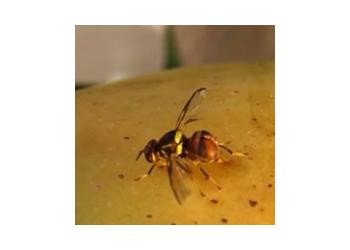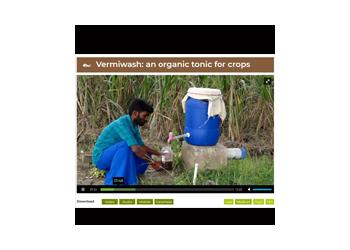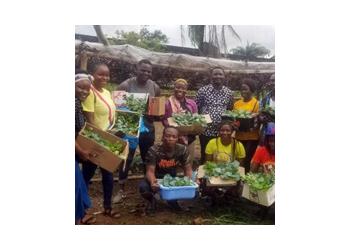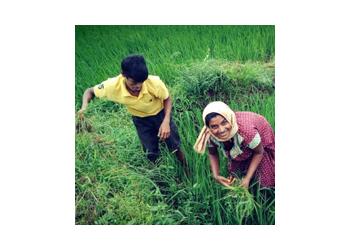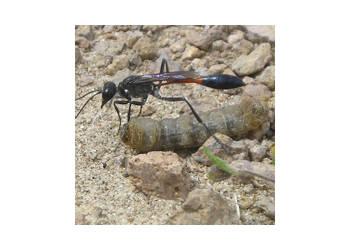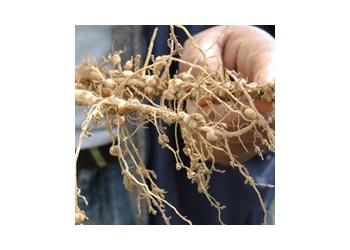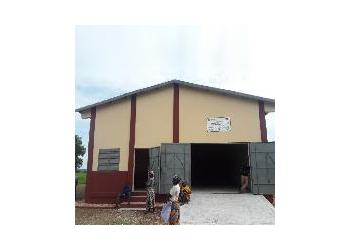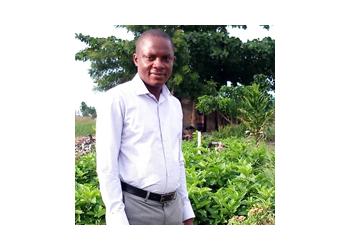Blogs
Building a better fruit fly trap
The Mediterranean fruit fly is a worthy enemy. This pest, also known as the medfly, is widespread over the tropics, attacking and spoiling oranges, mangoes and many other fruits. Each female can lay 200 eggs in her brief lifetime—allowing rapid population growth. The medfly damages so much high value fruit, that many people would like to eradicate it entirely.
The medfly has inspired some bizarre responses, such as spraying suburban Los Angeles with Malathion (insecticide) in the 1980s. Then there is the sterile male technique, which has been used from South America to South Africa…
Planting their way to self-reliance
A little idea can go a long way. This is what Simon Adriko learnt when he started showing farmer-training videos to residents of the refugee settlements in the West Nile region of Uganda to increase agricultural productivity, improve their livelihood and make them self-reliant.
With about 1.4 million refugees, Uganda is one of the largest refugee-hosting countries in the world. It has also one of the most progressive refugee policies in the world that enables refugees to become self-reliant and lead a dignified life while in exile. In addition to multiple services, they receive…
Trying it yourself
Helping to write a script for a farmer training video on vermiwash triggered my interest in trying it out myself, as I began to wonder if ideas from tropical India could work in temperate Belgium.
As the video explains, vermiwash is the liquid that is collected after water passes through compost made by earthworms. It is rich in plant growth hormones, micro-nutrients like iron and zinc, and major nutrients like nitrogen, phosphorous and potassium. Vermiwash increases the number of beneficial micro-…
Backyard farming: a lifeline during COVID-19
With food supply disrupted by COVID-19, concerns about food security have led to increased interest in growing food at home. This is particularly true for vulnerable communities as indicated by Access Agriculture analysis, which shows that its farmer-training videos promoting backyard farming such as ‘Using sack mounds to grow vegetables’ were among the most popular downloads from its video platform during the COVID-19 lockdown.
“If we could just grow fruits and vegetables around our homes, it could…
Using community radio as a force for change
The Panzarawani Community Radio Station, named after the river Panjhra in Dhule district of Maharashtra in Western India, is bringing about a welcome change to marginalised indigenous ethnic communities by broadcasting information on good agricultural practices. Panzarawani reaches around 72,000 listeners in 90 villages.
“I am pleased that for the first time thanks to Panzarawani, Access Agriculture audio tracks in the Marathi language on low-cost organic farming techniques have been broadcast through radio in Maharashtra to help disadvantaged communities,” said Atul Pagar,…
Good bugs: unknown, misjudged and embattled
Gooseberries were my grandmother’s favourite.
All different varieties - with fruits of varying colour, shape and crispiness – lined the pathways of her tiny backyard garden in western Flanders. Over the span of her life, she had steadily collected them by exchanging cuttings with friends, neighbours and other amateur horticulturists. Having nursed them into full-grown bushes, she annually gathered buckets-full of succulent berries from them – to be turned into the most appetizing jams, sweets or savoury spirits.
From early spring till autumn,…
The Fate of Food
In ‘The Fate of Food’, Amanda Little (professor of journalism and science writing at Vanderbilt University) takes us on a strange journey to the cutting edge of agricultural research. Little has an astonishing knack for getting quality face time with some of the most innovative (and busy) people in the science of food.
She takes us to Shanghai to meet Tony Zhang, an entrepreneur who dreamed of being the Whole Foods (grocery store chain) of China. Zhang was so enraged when he found out that his vegetable farmers were growing special plots of organic produce just for their own…
No word for legume
I remember a story from grad school about a people in the Amazon Basin who had no word for “parrot”, because they knew the names of all the individual species of parrots.
I was reminded of that this week in Peru, where I was teaching a course on how to write fact sheets and video scripts for a popular audience.
My students are seasoned professionals, and one group was writing a fact sheet about planting legumes to fix nitrogen from the air, as a non-chemical way to improve the soil, a crucial concept for ecological agriculture. Along with the students, I struggled to say “…
Timely harvest
Timely harvest is important to avoid losses. This is an important lesson that farmers in Benin learnt from videos on improved harvest and post-harvest practices for maize and cowpea as part of training programmes organised by Iles de Paix (Islands of Peace), a Belgian NGO.
The Iles de Paix team in Benin uses Access Agriculture farmer-learning videos in French and in the local ‘Dendi’ language to train its targeted farming communities, sharing information on good agricultural practices. Since 2016, 80 farmer-trainers including women, have been trained every year and they in turn are…
Pay and learn
Extensionists often give information away for free, but selling it may get you a more tuned-in audience. This is the conclusion of researcher Gérard Zoundji and colleagues in a recent paper published in Experimental Agriculture.
Zoundji compared three groups of people in West Africa who had received DVDs with farmer learning videos. Several video collections covered topics related to vegetable production or how to manage the parasitic weed striga. The videos could be shown in multiple local languages, or in English or French.
When NGOs in Benin gave the DVDs to organized…

